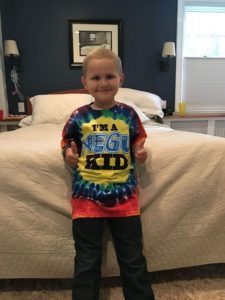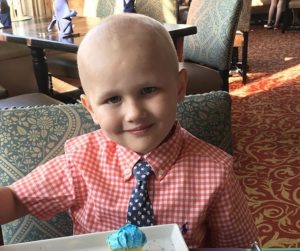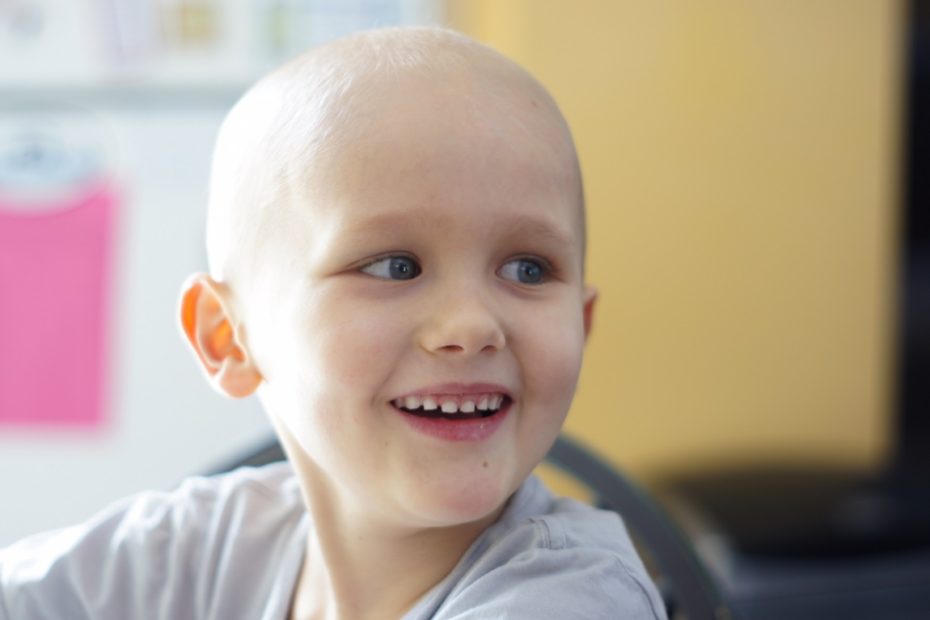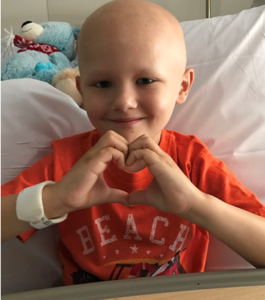“Then here’s this little boy who is always trying to make me feel better.” – Jennifer, Cooper’s mom
The surgery may have removed Cooper’s tumor, but it also left him unable to walk, talk or swallow on his own. It was due to posterior fossa syndrome (PFS), a common side effect in children following a procedure to remove his medulloblastoma. His parents, Jennifer and Ripley, could only encourage him as Cooper started the torturous trek back to living like a normal kid.
It all started with a road trip to see family when Cooper started throwing up occasionally. Naturally, they turned the car around and headed to the doctor. At first, they thought it was merely a virus. Then, several weeks later, the headaches came. Suddenly, his vision worsened.
Cooper rarely complained, so his parents knew something was wrong. They returned to the ophthalmologist, hoping some glasses might fix the issue. Instead, doctors discovered inflammation on his optic nerve, prompting the trip to Boston Children’s Hospital that led to his cancer diagnosis. Cooper took it in stride.
“Right before he went into surgery, he was trying to figure out jokes to tell the neurosurgeon,” said Jennifer.
His affable nature was key to helping his family face this disease in the coming months. They particularly needed it after learning about his PFS diagnosis.
“Right after his surgery we lived at Spaulding rehab for three months,” said Jennifer. “He was pretty much paralyzed, so he had to re-learn how to walk, talk, eat and move. It was a scary time.”
 Throughout that period, Cooper continued proton therapy and chemotherapy at Boston-area hospitals. Overwhelmed by the sheer volume of appointments, Cooper’s parents sought something to keep track of their whirlwind life. That’s when they learned about Alex’s Lemonade Stand Foundation (ALSF).
Throughout that period, Cooper continued proton therapy and chemotherapy at Boston-area hospitals. Overwhelmed by the sheer volume of appointments, Cooper’s parents sought something to keep track of their whirlwind life. That’s when they learned about Alex’s Lemonade Stand Foundation (ALSF).
“We are type-A, organized people so were asking if anyone has an online or hard copy book to help organize this stuff,” said Jennifer. “They said that Alex’s Lemonade Stand Foundation does; we got the treatment journal and were like, this is it!”
Keeping organized is just one way that Cooper’s parents have tried to make sense of the situation. Cooper’s rehab was arduous, but they found hope in the little moments like contests to see who could wiggle their ears or his Lego obsession.
“All along the way all you think is how you’re depressed,” said Jennifer. “Then here’s this little boy who is always trying to make me feel better.”
They finally released Cooper to head home in February 2017, where his chemotherapy regimen stretched into 2018. By March of that year, Cooper finished chemotherapy and returned to school for his second grade year that fall. With his hair growing back and a sense of normalcy returning to his regular days, his confidence is finally growing.
“He got his port out and I was pretty interested to see how that affected him  psychologically,” said Jennifer. “It really lifted him up with a whole new energy; he felt like a kid again and less like a patient.”
psychologically,” said Jennifer. “It really lifted him up with a whole new energy; he felt like a kid again and less like a patient.”
With Cooper improving, his family has also taken the opportunity to give back. They’ve started fundraising, even setting up a hero fund with ALSF to support medulloblastoma and pediatric brain tumor research. Their raised over $65,000 at their first annual bowling bash.
“It was important for us to partner with somebody who had the structure to bring us to researchers like Alex’s can,” said Jennifer. “We also like the big data approach and the innovation designed to really make a difference.”
Always someone to see the silver lining, Cooper hopes to use his optimistic viewpoint to help others.
Donate in honor of Cooper to support childhood cancer research!
Your donation helps Alex’s Lemonade Stand Foundation fund critical pediatric cancer research projects across the country.





